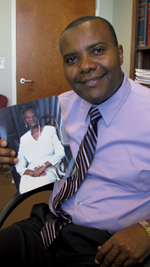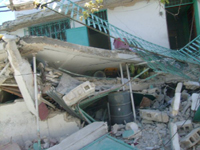|
|
|

|
Pharmacy grad honors mother's memory
|
by Dawn Brazell
Public Relations
When the Magnitude 7 earthquake hit Haiti on Jan. 12, Jean Hilaire
stopped what he was doing to watch it on CNN. Just months away from
graduating from the South Carolina College of Pharmacy, Hilaire found
he couldn’t focus on his rotation.
He had to know if his family was alive.
 Dr. Jean Hilaire
holds a picture of his mother, Sylvie. Dr. Jean Hilaire
holds a picture of his mother, Sylvie.
Hilaire got a two-week leave from his January acute care rotation to
better be able to search for any news from his homeland. After three
excruciating days of waiting, he learned that his mother had been
killed.
“It was a big blow to me. I cried like a little baby,” he said,
recalling how hard the process was since he was isolated from the rest
of his surviving family. He fortunately had just made a trip to Haiti
during the holidays to visit family, a smile lighting up his face as he
recounts how much fun his mother and sister had making so many of his
favorite meals.
One of the worst parts of being in Charleston during the aftermath of
the earthquake was waiting for word, he said. Though he heard about his
mother in the first few days, it would not be until the next week when
he found out that his sister also had been killed.
“It was like a victory to find the bodies. When they found my sister,
it was such a relief.”
Hilaire, the youngest of six siblings, said his mother and sister were
loving, Christian people who lived by example. Desperate to get home to
make sure his mother and sister had proper burials, Hilaire managed to
get onto a MUSC medical missions flight to Haiti with Shane Woolfe,
M.D., and his team. He worked as a guide and an interpreter, helping to
get the team set as he adjusted to the change in scenery around him.
 The four-story
building that crushed the first floor where his mother, sister and
niece used to live in Impasse Laraque 10, Lalue, Port-au-prince, Haiti. The four-story
building that crushed the first floor where his mother, sister and
niece used to live in Impasse Laraque 10, Lalue, Port-au-prince, Haiti.
“It was like a war zone. It was such complete devastation.”
Hilaire, who used to roam this area playing soccer and throwing fish
nets into the ocean, said it was hard to take in all the damage. Gone
were entire schools and buildings he used to know. When he finally made
it to his village, his entire house was gone. Hilaire made sure the
family burials were handled well, took some pictures and paid his
respects.
When Hilaire had said his good-byes, he returned to the hospital in
Bonne Fin still in shock at the destruction and the number of patients
needing amputations. As an interpreter, he had to tell one patient his
leg had to be amputated. The man was distraught, so Hilaire did what he
could to get the wound treated and the patient put on medications that
might help. It turned out, they did, and the man’s leg was saved.
Hilaire said it felt good to be able to help in whatever ways he could.
Though colleagues have been surprised by the Haitians’ resilient
spirit, it doesn’t come as a surprise to Hilaire. Haiti is a rugged
place geographically, and its people have faced a long list of
struggles from natural disasters to political upheavals. Hilaire
doesn’t have family pictures from his childhood because those were lost
during a hurricane. “It’s a tough place, but in the midst of that
people find a way to enjoy life. They are very good people. They have
good souls.”
When Hilaire returned to MUSC, some people expected him to take a break
from his studies to deal with his shock and grief. Hilaire decided to
push forward to graduate, and he was able to make up the two weeks of
missed time. It helped that his class stood behind him in a way that
still surprises him by its generosity.
“When the tragedy happened in Haiti, the amount of support I received
from them, the prayers and everything—the financial support that was
outpouring—it was just amazing. I don’t think I’ve ever been in such an
environment like that. I think the Southern hospitality is just
amazing. Once folks get to know you, you’re like family to them.”
That support and the memory of his mother kept him going, said Hilaire,
now a PharmD.
“It was sheer determination. I felt I had to go on. I’m still trying
hard to focus, and it’s getting better. My mom would want me to go on.”
Hilaire, who has 14-year-old twins who live in Miami, said he hopes to
work in Miami for awhile after graduation and then eventually return to
Haiti to open up his own pharmacy on the outskirts of Port-au-Prince.
His father, a Baptist minister, taught him the importance of giving
back. Seeing himself as a positive person, Hilaire believes in being
involved in community and being available to lend a helping hand.
He knows first-hand how it feels to be supported by such a community,
and he thanks God for having placed him in such an environment, he
said. The experience has left its mark.
“Life is very fragile. I don’t take my loved ones for granted anymore,”
he said. “You go to Haiti, and you don’t take things for granted
anymore. It makes life richer.”
Friday, May 21, 2010
|
|
|




